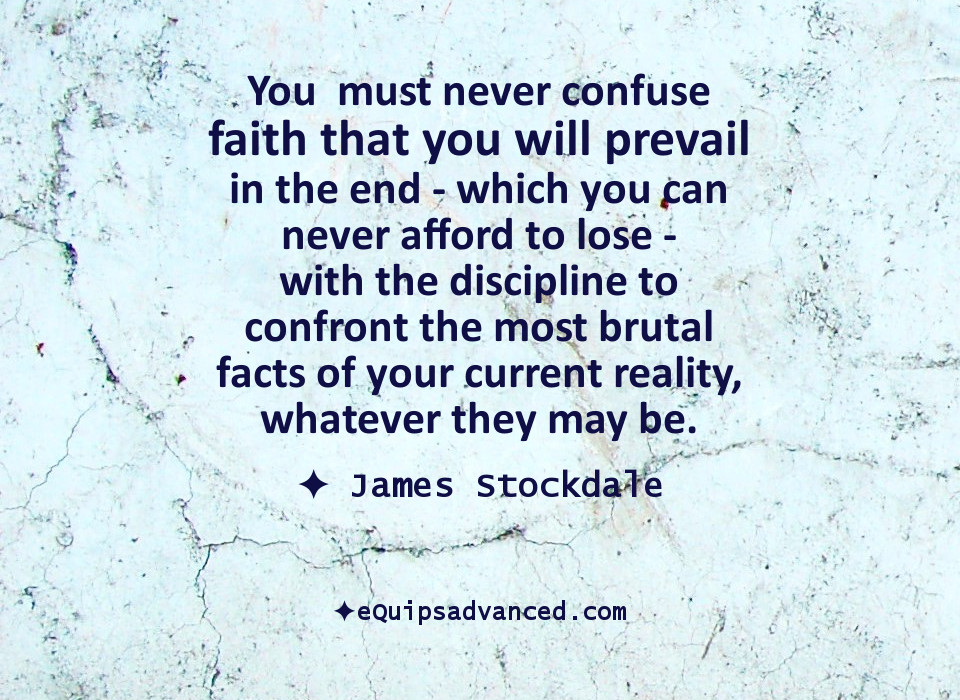“eQuips” are the practical philosophies of advanced thinkers, distilled through aphorism and crisp one-liners. We are not left to fend for ourselves, bereft of guiding lights. We can read the testaments of those who have gone before us. We can listen to the podcasts of those who press on ahead. We can learn from others. We can adapt new strategies and new mental models to our particular projects.
Like Sir Isaac Newton, we may stand on the shoulders of giants! – But we step up by equipping ourselves each day, with courageous hearts and a commitment to critical thinking. This, while cultivating the quixotic freedom to imagine: the improbable, the uncharted, or the whimsical.
In eQuips – Part 1 we examined the importance of choosing to be courageous. In this, Part 2 (of 3), we tackle the necessity of critical thinking…
…we may stand on the shoulders of giants!
CRITICAL THINKING
A principle known as the Stockdale Paradox demands an equal measure of courageousness and critical thinking in the face of adversity. That is as opposed to mere optimism. – Although it is only a paradox if and when optimism parts ways with fact based decision making. – The idea is that we have to engage the truth of any situation. We must wrestle with real things, as they are, range as they may from the uncomfortable to the brutal.
We are citizens of nations. We are employees of organizations. We are members of communities. As such, we are obliged to understand, not merely to judge. Neither spite nor favoritism, for instance, should supersede the actual stakes of a given issue. That is, if we expect to arrive at effective and lasting solutions to the various problems that confront us.
The challenge is to advance our thinking. We need to distinguish, at every turn, what we know from what we don’t know – and to develop a sense of proportion. As the historian Will Durant says, we want to know that the little things are little and the big things big, before it’s too late. Advanced thinkers – eyes and minds wide open – strive always for a comprehensive view!

Advanced Thinkers are problem solvers
It may need to be said that advanced thinking, though it sounds elitist, is not a ‘status’ thing.
Advanced thinking is about solving problems (i.e., advancing your agenda). It is for everyone. It is for anyone that wants to improve their ‘game’ – be it personal or work related. According to psychologist Jordan Peterson, most of what we consider “thinking” is no more than self-criticism. Often it is criticism of others! In any case, mere criticism, as opposed to critical thinking, is not conducive to solving problems.
If you say to yourself, “I am a failure,” you won’t progress. Advanced thinkers ask, instead:
What happened?
What can I learn from this?
What different approaches might I try?
Critical thinking is the logical portion of this process. It is the self-examination and situational analysis. As critical thinking individuals, we identify our biases and fears. We question our assumptions. We open our hearts and seek new perspectives.
Such introspection takes courage, learning and quixotic vision. Cultivating this bundle of aptitudes is the purpose of advanced thinking. We thereby develop personal and professional mastery over time.
By sharing the wit and wisdom of other advanced thinkers, this blog aims to further such progression for readers. We draw insight from entrepreneurs, writers, philosophers, artists. The lessons they have to teach demonstrate courageousness and path finding.
From Hawking to Picasso, from Carrie Fisher to Simon Sinek, we learn to break down barriers, embrace novel perspectives, and develop better solutions to a host of social or business conundrums. Why settle for less? Let us learn from – and think with – the best!

Your comments and feedback are important! Please see the Table-13 Code of Conduct before leaving a reply. All comments are moderated.
Newman, D R; Webb, Brian; Cochrane, Clive (1995). “A content analysis method to measure critical thinking in face-to-face and computer supported group learning”.